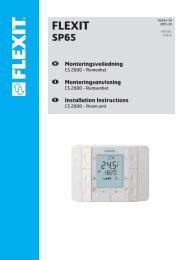ACX32/34 OPC - Flexit
ACX32/34 OPC - Flexit
ACX32/34 OPC - Flexit
Create successful ePaper yourself
Turn your PDF publications into a flip-book with our unique Google optimized e-Paper software.
3 Remote <strong>OPC</strong><br />
3.1 What is Remote <strong>OPC</strong><br />
General<br />
The Remote<strong>OPC</strong> application is an <strong>OPC</strong> DA server as well as a management function,<br />
for RCC dial-up connections or/and TCP/IP connections, that runs on the WinXP or<br />
Win2000 operating system in the client PC. The number of dial-up connections that can<br />
be established simultaneously is limited by the hardware used (number of COM ports<br />
with modems). The number of RCC's that can be managed is theoretically unlimited.<br />
The Remote <strong>OPC</strong> is running as a service on the client PC. For each RCC it creates<br />
cache files for fast access and offline browse.<br />
See the PD972-25-009_EN document for more details.<br />
3.1.1 TCP/IP connection<br />
TCP/IP<br />
The Remote <strong>OPC</strong> server can also have access to the RCC via a direct TCP/IP<br />
connection. The direct TCP/IP connection is always online.<br />
Either the IP address or the RCC name can be used.<br />
3.1.2 Dial-in/out connection<br />
Dial-In function<br />
Dial-Out function<br />
An RAS dial-in connection is parameterized on the PC for each COM modem interface.<br />
If a connection is established by an incoming call, the management part of the<br />
Remote<strong>OPC</strong> server compares the RCC's name (e.g. SBT_RCC_V2_ABCD) with the<br />
names of the permitted RCC’s. If the name is known, the server checks whether the<br />
objects in the Saphir controller are known. If so, the <strong>OPC</strong> DA server sets the objects<br />
online. If not, the Saphir controller's Object Handler is interrogated, and the controller is<br />
added to the Remote<strong>OPC</strong> server's namespace. The controller's <strong>OPC</strong> tags are then<br />
available. The tags are valid as long as the connection to the RCC remains established.<br />
The initiator of an active dial-in connection must break the connection again.<br />
A connection must be established to a given Saphir controller if a given event occurs<br />
when there is no online connection. The RCC name is included in the corresponding<br />
<strong>OPC</strong> tag name (event trigger). A dial-up modem connection must be parameterized for<br />
each RCC name on the system. The appropriate connection is activated when the<br />
event occurs.<br />
Since multiple connection names can be parameterized on the "Modem-X" hardware<br />
resource, the resource may already be occupied by another outgoing connection or by<br />
an incoming call from another RCC. In this case, the event must be postponed. When<br />
the defined time (Time_Con_Retry) expires, a new attempt is made to connect to the<br />
respective Saphir controller.<br />
The number of repeat connect attempts is set using the "Con_Retry" parameter.<br />
These parameters are passed in the "Rem<strong>OPC</strong>_Env.csv" environment file.<br />
3.1.3 Online / Offline handling<br />
As long as there is an active connection to one or more of the RCC’s to be managed,<br />
the data of the respective controller(s) is marked as valid. Process data changes are<br />
updated in the server's process image via the COV handling mechanism, and the<br />
clients that are logged on are updated.<br />
As soon as there is no longer an active connection, the tags are marked as offline.<br />
8/<strong>34</strong><br />
<strong>Flexit</strong> AS<br />
94222E

















